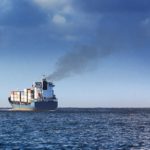Geopolitics, decarbonisation, and shipping’s future

At the London International Shipping Week headline conference, Yana Popkostova, the founder and managing director of the European Centre for Energy and Geopolitical Analysis, delivered a speech that delved into the complex relationship between geopolitics, decarbonisation, and the shipping industry. Popkostova’s expertise in energy and climate geopolitics provided invaluable insights into the challenges and opportunities that lie ahead.
She set the stage by highlighting the significance of considering geopolitics and decarbonisation in the industry’s resilience plans. According to Popkostova: “It’s important for all of us to try to unpick today the Gordian knot of geopolitics and decarbonisation, and what it means for the industry.”
She also pointed out how the geopolitical landscape has been reshaped by events like the Ukraine conflict, leading to significant shifts in commodities, prices, and markets, both in hydrocarbons and green commodities.
In her speech, Popkostova discussed the compounding challenges posed by climate change, supply chain transformations, and global debt, which contribute to geopolitical fragmentation and affect the security of economies and seaborne trade. Making specific reference to Russia, she said: “In the unfolding world, terminating the umbilical cord with Russian hydrocarbons is warranted, but it will far from secure energy security, not least for Europe as one of the most resource poor places on Earth, but also in view of the escalating climate emergency in our neighbourhood.”
While emphasising that decarbonisation is essential, she noted that it will dramatically transform commodity trading, trade routes, and infrastructure.
Finding a balance between environmental stewardship and business profitability will be key to success.
Energy outlook
On the energy front, Popkostova highlighted the decline in coal and oil consumption, with gas also plateauing by the mid-2030s. LNG, however, is expected to increase its market share, disrupting a significant portion of seaborne trade. “This in practice will disrupt almost 40% of seaborne trade, which currently relies on energy products,” she said. Uptake of clean technology and fuels will fail to compensate for the disruption, according to European Centre for Energy and Geopolitical Analysis’ modelling.

She also pointed out that green commodity markets, including metals like copper, steel, and aluminium, face competition and deficits, leading to hidden inflationary pressures.
In terms of compliance, Popkostova noted that pressure on ship owners to comply with sanctions regimes will expose the industry to increased scrutiny. “Suspending the provision of cargo services to Russia would make sovereign insurance coverage and sovereign vessels more widely used by non-democratic countries, particularly Russia, Iran and China and this is already the case today, but also India, Turkey, the Gulf states are increasingly using such vessels and sovereign insurance in order to circumvent sanctions regime, but also to test to a certain extent the remit of the G7 framework,” she said.
In addition to the “challenges related to commodities”, key jurisdictions such as the EU, the US and others are starting to focus on the emissions associated with shipping – the sector will become part of the EU ETS from January 1 next year. In addition to that, multinationals and key traders such as IKEA, Unilever, and Amazon have announced they will only use Net Zero ships in the future.
Hope for hydrogen
Popkostova, meanwhile, highlighted hydrogen as a viable option for decarbonisation but cautioned that the current hype is not always matched by tangible projects on the ground. “Some of our modelling shows that there can be a gap of about 15 vessels per year by 2030 in terms of ability to supply low carbon, hydrogen and ammonia,” she said. Infrastructure development and practical initiatives are needed.
Additionally, as the industry moves toward green methanol and green ammonia, training personnel to handle toxic and highly flammable cargoes will be crucial. “And there is a lack of personnel actually able to handle the increased amount of those cargoes in the future,” she added.
She stressed that hydrogen should be prioritised in national strategies to allow access to public funds, financial vehicles, subsidies, and grants for the industry. “So far, it seems to me that the record of the industry can be significantly optimised in terms of this organised lobbying towards governments. Becoming a driver and beneficiary of the hydrogen economy can present a strong transformation opportunity that has to be harnessed,” she said.
Popkostova also warned of the need to consider climate-related risks and cyber threats, emphasising that resilience extends beyond emissions reduction to preparedness for extreme weather events and cyberattacks.
Further, intensified storms could lead to blockages of key choke points, such as the Suez or Panama canals, and compounding tensions in the Strait of Hormuz or the already highly charged and militarised South China Sea could potentially threaten freedom of navigation and disrupt key trade corridors. “Climate change could also compound preexisting conflict dynamics over scarce resources and intensify people displacement, disrupting supply chains and maritime safety.”
North vs South
Asking shipping to check its moral compass, Popkostova pointed out that achieving Net Zero in the Global North while leaving behind the climate-broken Global South is hardly conducive to a thriving shipping sector. “Here the industry can lobby for accelerated infrastructure financing, lifting intellectual property rights and accelerating transfers to green technologies to developing countries. In addition, the sector can foster a facilitative role of transitions beyond invasive mining associated with environmental and human rights infractions.”
In a final rallying call, Popkostova said that economic, geopolitical and energy transition uncertainties present cost, security reputational and business model waves to the industry that will require innovation in synergy with governments, traders, and civil organisations to navigate safely going forward. “Industry participants should emphasise the sector’s existential role in attaining climate neutrality, rebranding from high emitter to a galvaniser of the Net Zero economy and enabler of the energy transition,” she concluded.
Source: Baltic Exchange
Source link
